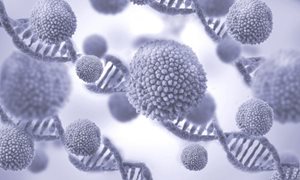
RNA is at the prime focus of attention. Not only because of the various corona vaccines that are based on RNA technology, but also because of the therapeutic applications that are rapidly increasing in number. In an article in EMBO Molecular Medicine, researchers from Radboudumc, together with European colleagues, provide an up-to-date overview of the (im)possibilities of these intriguing RNA therapies.
Until recently, drugs targeting the RNA were considered a curiosity. They were mainly used in the research of rare diseases and personalized therapies. These RNA therapies are aimed at altering the RNA, which functions as an intermediate step between DNA (genes) and proteins. If there is an error in the DNA, you can try to correct that error in the RNA. This is possible by "masking" the wrong RNA piece, for example, with a piece of RNA that has been made specifically for a certain condition. With this strategy, the mistake can be corrected or made illegible.
RNA therapies on the rise
This new research area has undergone an enormous development in recent years. More than a dozen RNA drugs have now been approved for use in patients. Many other RNA-based drugs are at various stages of development. Although rare diseases are still a major target, many of these drugs are being developed for diseases that are common and that many people suffer from, such as hyperlipidemia (too much cholesterol in the blood) or certain types of cancers.
Delivery is key
Alex Garanto, researcher at the Department of Pediatrics at Radboudumc and one of the authors of the paper: “The main hurdle for this type of medicine is delivery. The RNA must be delivered to the correct tissue or organ, because it has to do its job just there and nowhere else. In addition, you also have to consider how you can effectively get it into the cells, because not all cells actively absorb an RNA drug. This is an essential step, because the RNA can only do its job if it penetrates the right cells.”
Progress
The article in EMBO Molecular Medicine, written with colleagues from Leiden and thirteen European countries who are all studying the development of RNA therapies, focuses on this issue of the ‘delivery’. Professor of Molecular Therapy for Inherited Retinal Diseases Rob Collin, also a co-author in this publication, was recently interviewed about these developments in the NRC: “In recent years, we have made enormous progress in a better and more effective delivery of these RNA drugs to patients, whereby safety is also an important aspect in the development and evaluation of these drugs.”
European cooperation
The 22 authors of the paper are part of the European COST (Cooperation of Science and Technology) consortium. Via this European network (www.antisenserna.eu) they bundle their knowledge and expertise to develop meaningful RNA therapies for patients.
Paper in EMBO Molecular Medicine: Delivery of oligonucleotide-based therapeutics: challenges and opportunities - Suzan M Hammond, Annemieke Aartsma-Rus, Sandra Alves, Sven E Borgos, Ronald A M Buijsen, Rob W J Collin, Giuseppina Covello, Michela A Denti, Lourdes R Desviat, Lucía Echevarría, Camilla Foged, Gisela Gaina, Alejandro Garanto, Aurelie T Goyenvalle, Magdalena Guzowska, Irina Holodnuka, David R Jones, Sabine Krause, Taavi Lehto, Marisol Montolio, Willeke Van Roon-Mom & Virginia Arechavala-Gomeza
Related news items

Dutch-Nordic Alliance for Precision Cancer Medicine launched
26 November 2021 The Nordic countries (Denmark, Sweden, Norway, and Finland) are together setting up national clinical precision cancer trials modelled on the very successful DRUP trial in the Netherlands. go to page
Large AI project receives over €95 million for ten years of public-private research
23 September 2021 The Dutch Research Council (NWO) is to fund two consortia for a period of ten years. Radboudumc participates in the ROBUST consortium, which consists of 17 AI labs, eight of which are dedicated to healthcare. Radboudumc leads five of these eight labs. go to page
Nijmegen literally puts Digital Health on the map Flourishing ecosystem gets its own interactive overview
22 July 2021 Digital Health is thriving in the Nijmegen region, where it contributes to better care and health and also creates jobs. To bring developers and end users even closer together, The Economic Board and the Radboudumc are introducing the Interactive Digital Health map. go to page
Vici grant for Michiel Vermeulen Reading the epitranscriptome
15 April 2021Michiel Vermeulen, theme Cancer development and immune defense, has been awarded a Vici grant from the Netherlands Organisation for Scientific Research (NWO), one of the largest personal scientific awards in the Netherlands.
go to page
Miljoenen voor kennis- en investeringsconsortium op het gebied van AI
14 April 2021 Een kennis- en investeringsconsortium met het Radboudumc heeft acht miljoen euro subsidie gekregen om innovatie op het gebied van Artificial Intelligence (AI) versneld naar de markt te brengen. go to page
